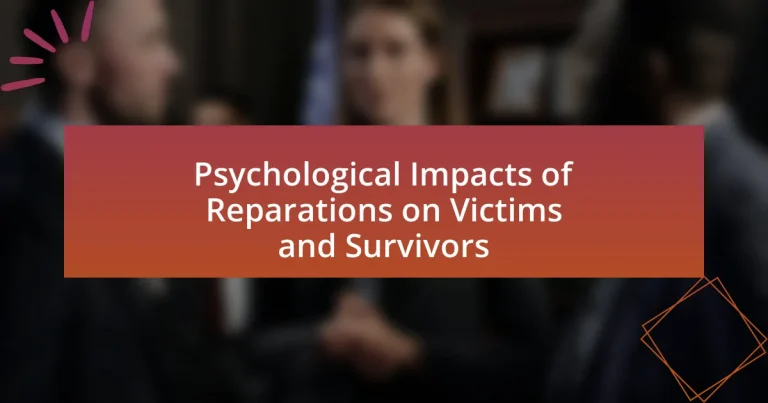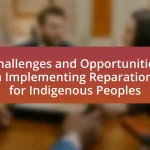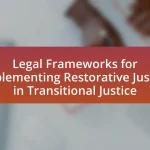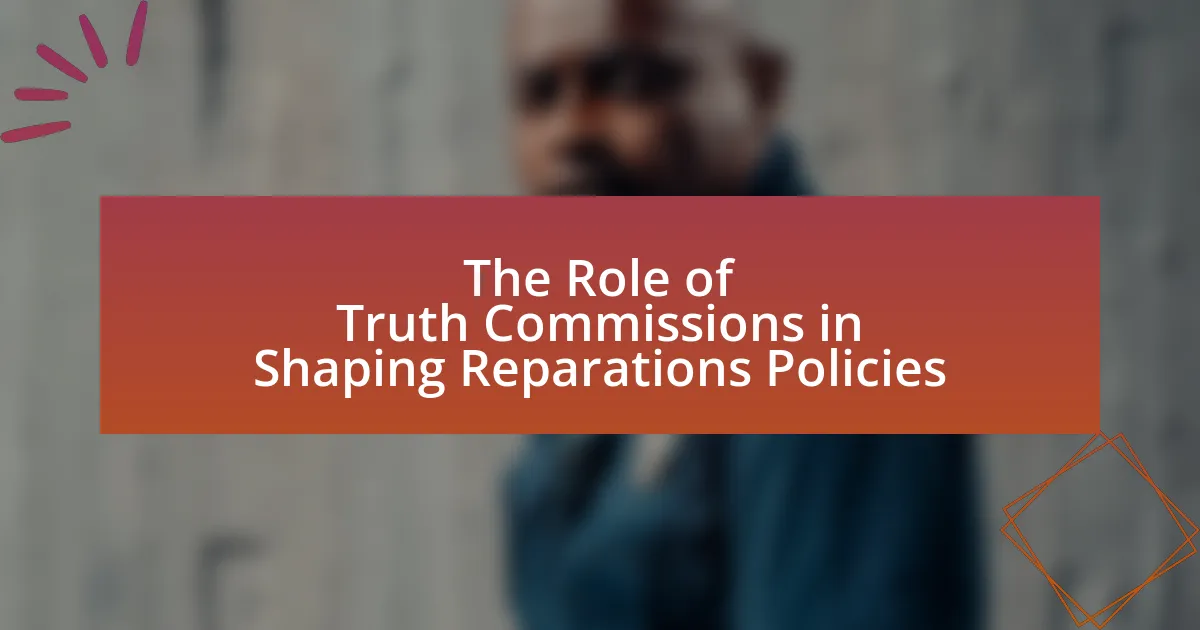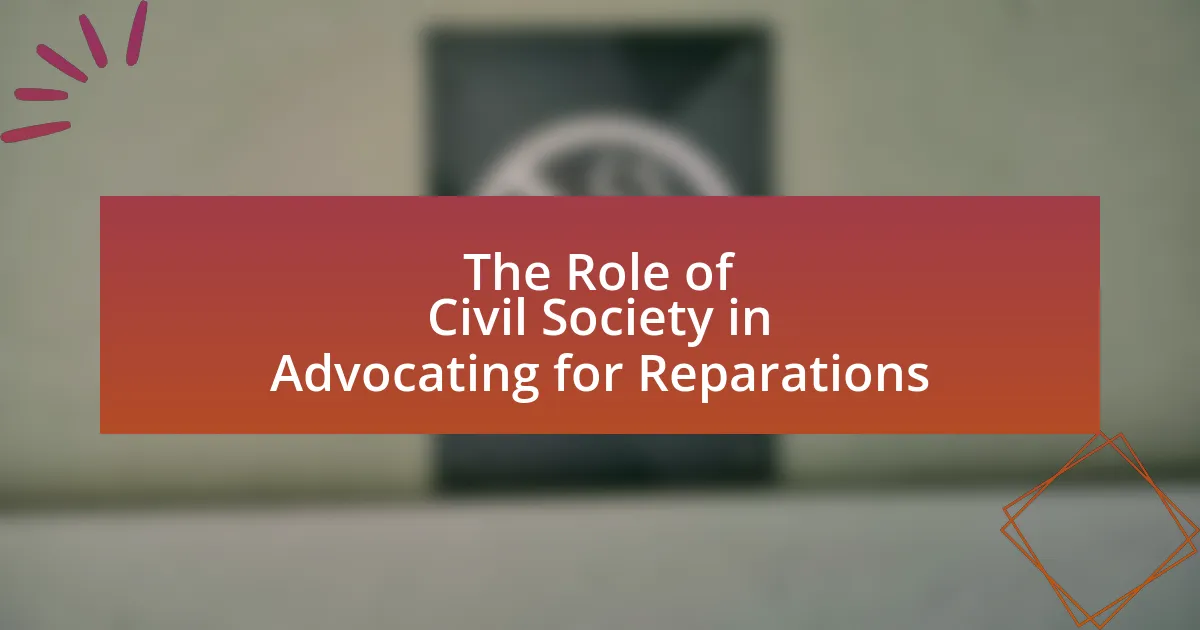The article examines the psychological impacts of reparations on victims and survivors of historical injustices. It highlights how reparative measures, including financial compensation and public acknowledgment, can alleviate psychological distress, improve mental health outcomes, and foster a sense of justice and closure. Key findings indicate that reparations contribute to reduced symptoms of PTSD and anxiety, enhance self-esteem, and promote community cohesion. The article also addresses the challenges faced by victims in the reparations process and explores the long-term psychological benefits, including the potential to mitigate intergenerational trauma and improve societal acknowledgment of past wrongs.
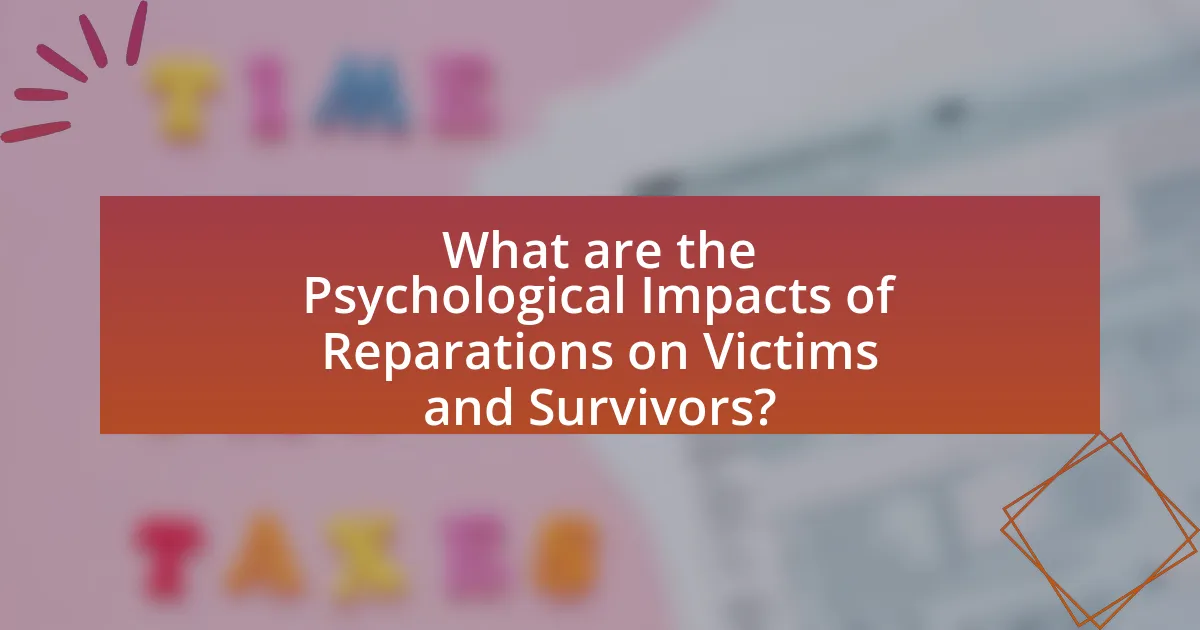
What are the Psychological Impacts of Reparations on Victims and Survivors?
Reparations can significantly alleviate psychological distress among victims and survivors by providing acknowledgment, validation, and a sense of justice. Research indicates that reparative measures can lead to improved mental health outcomes, including reduced symptoms of PTSD and anxiety, as they address historical grievances and foster a sense of closure. For instance, a study published in the Journal of Conflict Resolution found that communities receiving reparations reported higher levels of psychological well-being and social cohesion compared to those that did not. This suggests that reparations not only serve as a form of compensation but also play a crucial role in the healing process for individuals affected by trauma.
How do reparations influence the mental health of victims and survivors?
Reparations positively influence the mental health of victims and survivors by providing acknowledgment, validation, and financial support that can alleviate trauma. Research indicates that reparative measures can lead to improved psychological well-being by fostering a sense of justice and closure. For instance, a study published in the Journal of Trauma & Dissociation found that reparations contribute to reduced symptoms of PTSD and depression among survivors of historical injustices. This correlation is attributed to the restoration of dignity and the recognition of suffering, which are crucial for healing psychological wounds.
What specific psychological benefits can reparations provide?
Reparations can provide specific psychological benefits such as validation of suffering, restoration of dignity, and enhanced mental well-being for victims and survivors. By acknowledging historical injustices, reparations validate the experiences of marginalized groups, which can lead to improved self-esteem and a sense of belonging. Research indicates that when individuals feel recognized and valued, their mental health improves, reducing symptoms of anxiety and depression. Furthermore, reparations can facilitate healing by promoting community solidarity and resilience, as seen in various post-conflict societies where reparative measures have been implemented, leading to collective psychological recovery.
How do reparations address trauma experienced by victims and survivors?
Reparations address trauma experienced by victims and survivors by providing financial compensation, acknowledgment of harm, and facilitating healing processes. Financial compensation can alleviate economic burdens that exacerbate trauma, while acknowledgment of historical injustices validates the experiences of victims, fostering a sense of recognition and dignity. Studies, such as those conducted by the American Psychological Association, indicate that reparative measures can lead to improved mental health outcomes by promoting resilience and community rebuilding. Furthermore, reparations can support therapeutic initiatives that directly address the psychological impacts of trauma, thereby enhancing overall well-being for affected individuals.
Why are reparations considered important for psychological healing?
Reparations are considered important for psychological healing because they acknowledge and address historical injustices, providing validation and recognition to victims and survivors. This acknowledgment can lead to a sense of closure and empowerment, which are crucial for mental health recovery. Research indicates that reparative measures can reduce feelings of anger and resentment, fostering a pathway toward reconciliation and healing. For instance, a study published in the Journal of Social Issues highlights that reparations can significantly improve psychological well-being by restoring dignity and promoting social justice, ultimately aiding in the healing process for affected communities.
What role do reparations play in restoring dignity and identity?
Reparations play a crucial role in restoring dignity and identity by acknowledging historical injustices and providing compensation to affected individuals or communities. This acknowledgment helps validate the experiences of victims and survivors, fostering a sense of recognition and respect for their suffering. For instance, studies have shown that reparative measures can lead to improved mental health outcomes, as they address feelings of marginalization and promote healing. Furthermore, reparations can facilitate the reclamation of cultural identity, allowing communities to reconnect with their heritage and restore pride. This process is supported by historical examples, such as the reparations paid to Holocaust survivors, which have been linked to enhanced psychological well-being and social reintegration.
How do reparations contribute to collective healing within communities?
Reparations contribute to collective healing within communities by addressing historical injustices and fostering a sense of acknowledgment and validation among affected individuals. This process helps to rebuild trust within communities that have experienced trauma, as reparations serve as a formal recognition of past wrongs, which can alleviate feelings of anger and resentment. Research indicates that communities receiving reparations often report improved mental health outcomes, as the act of reparations can facilitate dialogue and reconciliation, leading to a shared understanding of the past. For instance, the Truth and Reconciliation Commission in South Africa demonstrated that reparative measures can promote healing by allowing victims to share their stories, which is essential for psychological recovery.
What challenges do victims and survivors face in the reparations process?
Victims and survivors face numerous challenges in the reparations process, including bureaucratic hurdles, emotional distress, and societal stigma. Bureaucratic hurdles often manifest as complex application procedures and lengthy waiting times, which can exacerbate feelings of frustration and helplessness among victims. Emotional distress arises from reliving traumatic experiences during the claims process, potentially leading to re-traumatization. Additionally, societal stigma can result in isolation or discrimination, making it difficult for survivors to seek support or engage with their communities. These challenges hinder the effectiveness of reparations and can impede the healing process for victims and survivors.
How can the reparations process trigger additional trauma?
The reparations process can trigger additional trauma by reopening historical wounds and forcing victims to confront painful memories associated with past injustices. This confrontation can lead to feelings of anger, grief, and helplessness, exacerbating existing psychological distress. Research indicates that discussions around reparations often involve public acknowledgment of suffering, which can be a double-edged sword; while it may validate experiences, it can also lead to re-traumatization as individuals relive their trauma in a societal context. For instance, a study published in the Journal of Trauma & Dissociation highlights that survivors of systemic violence may experience heightened anxiety and depression when engaging in reparations discussions, as these processes can evoke unresolved grief and loss.
What barriers exist that may hinder the psychological benefits of reparations?
Barriers that may hinder the psychological benefits of reparations include societal stigma, lack of awareness, and insufficient implementation. Societal stigma can lead to feelings of shame or isolation among recipients, undermining the intended healing effects of reparations. Lack of awareness about the reparations process and its potential benefits can prevent individuals from engaging with the reparative measures. Additionally, insufficient implementation, such as delays or inadequate compensation, can exacerbate feelings of frustration and distrust, ultimately diminishing the psychological impact that reparations are meant to provide. These barriers collectively impede the ability of reparations to foster psychological healing and empowerment among victims and survivors.
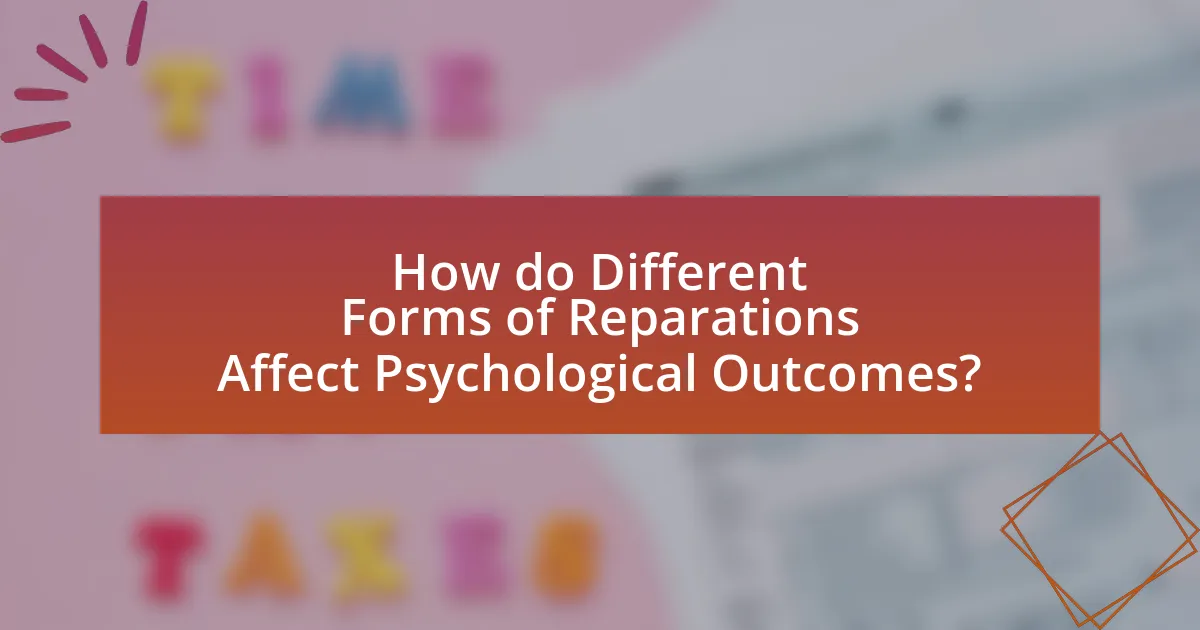
How do Different Forms of Reparations Affect Psychological Outcomes?
Different forms of reparations significantly affect psychological outcomes by addressing trauma and fostering healing among victims. Monetary compensation, for instance, can alleviate financial stress, allowing individuals to focus on mental health recovery, while public acknowledgment of harm can validate victims’ experiences, leading to improved self-esteem and social reintegration. Research indicates that reparations linked to restorative justice practices, such as community engagement and dialogue, enhance feelings of empowerment and agency, which are crucial for psychological well-being. A study by the International Center for Transitional Justice highlights that reparations contribute to psychological healing by promoting recognition and accountability, thereby reducing feelings of isolation and despair among survivors.
What types of reparations are available to victims and survivors?
Victims and survivors can access various types of reparations, including financial compensation, restitution of property, rehabilitation services, and guarantees of non-repetition. Financial compensation provides monetary support to address economic losses, while restitution involves returning property or assets taken from victims. Rehabilitation services may include medical care, psychological support, and social services aimed at restoring well-being. Guarantees of non-repetition focus on preventing future violations through legal reforms and institutional changes. These reparations are essential for acknowledging harm and facilitating recovery, as evidenced by international human rights frameworks that advocate for comprehensive reparative measures.
How do financial reparations impact psychological well-being?
Financial reparations positively impact psychological well-being by providing a sense of acknowledgment and validation to victims of historical injustices. This financial support can alleviate feelings of marginalization and foster a sense of empowerment, contributing to improved mental health outcomes. Research indicates that reparations can lead to reduced anxiety and depression among affected populations, as they help to address the emotional and psychological scars left by systemic discrimination. For instance, a study published in the Journal of Social Issues highlights that reparations can enhance self-esteem and community cohesion, ultimately promoting resilience and psychological recovery among survivors.
What is the significance of symbolic reparations in psychological healing?
Symbolic reparations play a crucial role in psychological healing by acknowledging the suffering of victims and validating their experiences. This acknowledgment can foster a sense of recognition and dignity, which is essential for emotional recovery. Research indicates that symbolic reparations, such as public apologies or memorials, can significantly reduce feelings of anger and resentment among victims, promoting psychological well-being. For instance, a study published in the Journal of Conflict Resolution found that communities receiving symbolic reparations reported improved mental health outcomes and a stronger sense of community cohesion. Thus, the significance of symbolic reparations lies in their ability to facilitate healing by providing recognition and fostering emotional resilience among victims and survivors.
How do community-based reparations initiatives influence psychological recovery?
Community-based reparations initiatives significantly influence psychological recovery by fostering a sense of belonging and validation among affected individuals. These initiatives often involve collective acknowledgment of past injustices, which can alleviate feelings of isolation and trauma. For instance, studies have shown that community engagement in reparative processes enhances social support networks, leading to improved mental health outcomes. Research published in the “Journal of Social Issues” by authors such as D. A. Williams and M. A. Williams indicates that communities that actively participate in reparations report lower levels of anxiety and depression, highlighting the therapeutic effects of communal healing and recognition.
What are the psychological effects of community engagement in reparations?
Community engagement in reparations has significant psychological effects, including enhanced collective identity, increased empowerment, and improved mental well-being among participants. Engaging in reparative actions fosters a sense of belonging and solidarity, which can mitigate feelings of isolation and trauma associated with historical injustices. Research indicates that community involvement in reparations can lead to greater resilience and a shared narrative that validates the experiences of marginalized groups. For instance, a study by the American Psychological Association highlights that collective healing processes, such as community dialogues and restorative justice initiatives, can promote psychological recovery and social cohesion. These effects underscore the importance of community engagement in addressing the psychological impacts of historical injustices.
How do restorative justice practices relate to psychological outcomes?
Restorative justice practices significantly enhance psychological outcomes for victims and offenders by fostering healing, accountability, and community support. These practices create a space for victims to express their feelings and needs, which can lead to reduced feelings of anger and anxiety. Research indicates that victims who participate in restorative justice processes report higher levels of satisfaction and emotional well-being compared to those who go through traditional justice systems. For instance, a study published in the “Journal of Criminal Justice” by Shapland et al. (2008) found that victims involved in restorative justice reported a 70% satisfaction rate, highlighting the positive psychological impact of these practices. Additionally, offenders often experience a sense of remorse and responsibility, which can lead to lower recidivism rates and improved mental health outcomes. Thus, restorative justice practices are closely linked to positive psychological outcomes for both victims and offenders.
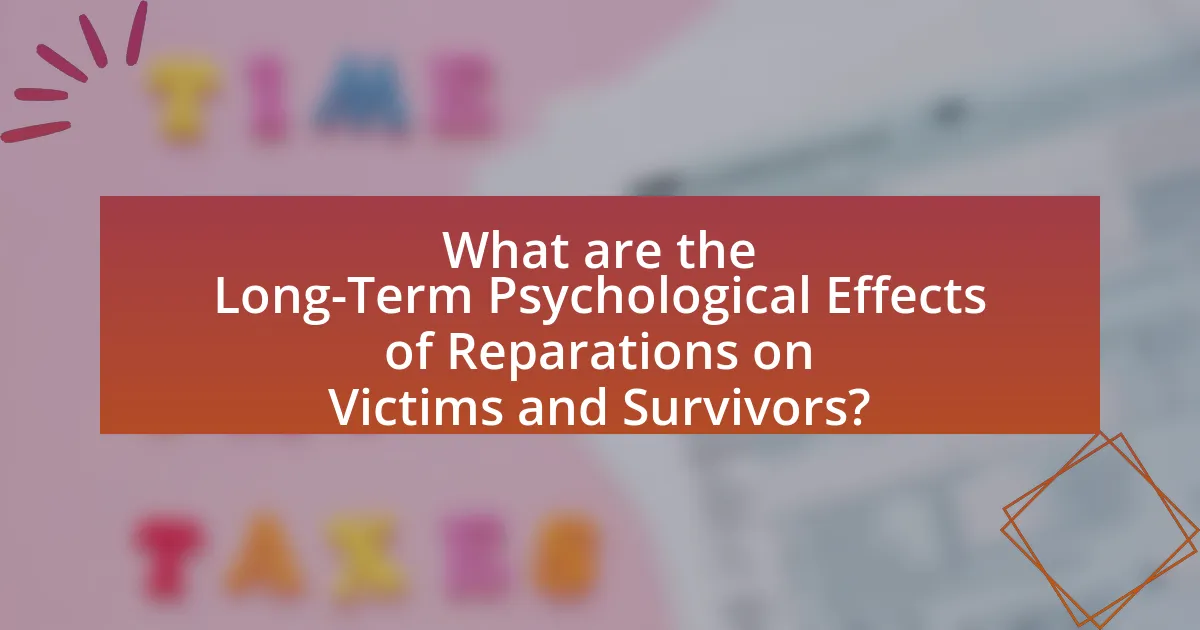
What are the Long-Term Psychological Effects of Reparations on Victims and Survivors?
The long-term psychological effects of reparations on victims and survivors include improved mental health outcomes, enhanced feelings of justice, and increased social cohesion. Research indicates that reparations can lead to reduced symptoms of PTSD and depression among affected individuals, as financial compensation and acknowledgment of suffering validate their experiences. For instance, a study published in the Journal of Conflict Resolution found that reparations contribute to psychological healing by fostering a sense of recognition and closure, which is crucial for recovery. Additionally, reparations can strengthen community ties and promote collective healing, as seen in post-apartheid South Africa, where reparative measures helped to rebuild trust among diverse groups.
How do reparations influence long-term mental health trajectories?
Reparations positively influence long-term mental health trajectories by providing acknowledgment, financial support, and resources that facilitate healing. Research indicates that reparative measures can reduce feelings of trauma and marginalization among affected populations, leading to improved psychological well-being. For instance, a study published in the Journal of Social Issues by authors like David R. Williams and others highlights that reparations can enhance community cohesion and individual self-esteem, which are critical factors in mental health recovery. Additionally, reparations can serve as a form of justice, contributing to a sense of closure and validation for victims, thereby fostering resilience and promoting healthier mental health outcomes over time.
What evidence exists regarding the lasting psychological benefits of reparations?
Evidence indicates that reparations can lead to lasting psychological benefits for victims and survivors of historical injustices. Research conducted by the University of California, Berkeley, highlights that reparations can foster a sense of recognition and validation among affected communities, which is crucial for psychological healing. A study published in the Journal of Social Issues found that individuals who received reparations reported lower levels of anxiety and depression, as well as improved self-esteem and community cohesion. Furthermore, the psychological impact of reparations is supported by historical examples, such as the reparations paid to Japanese Americans interned during World War II, which have been associated with improved mental health outcomes and a strengthened sense of identity among recipients.
How do reparations impact intergenerational trauma among victims’ families?
Reparations can significantly alleviate intergenerational trauma among victims’ families by providing financial resources and acknowledgment of past injustices. This financial support can enable families to access mental health services, education, and community resources, which are essential for healing and breaking the cycle of trauma. Research indicates that reparations can foster a sense of justice and validation, which is crucial for psychological well-being. For instance, a study published in the Journal of Social Issues highlights that reparations contribute to improved mental health outcomes by promoting resilience and reducing feelings of helplessness among affected families.
What role does societal acknowledgment play in the psychological effects of reparations?
Societal acknowledgment plays a crucial role in the psychological effects of reparations by validating the experiences and suffering of victims. When society recognizes historical injustices, it fosters a sense of legitimacy and support for those affected, which can lead to improved mental health outcomes. Research indicates that acknowledgment can reduce feelings of isolation and increase community solidarity among victims, enhancing their emotional resilience. For instance, a study published in the Journal of Social Issues found that acknowledgment of past wrongs significantly correlated with lower levels of depression and anxiety among marginalized groups. This demonstrates that societal recognition not only affirms the victims’ narratives but also contributes to their psychological healing and empowerment.
How does public perception of reparations affect individual psychological outcomes?
Public perception of reparations significantly influences individual psychological outcomes by shaping feelings of validation, identity, and social belonging. When the public views reparations positively, individuals from affected communities often experience enhanced self-esteem and a sense of justice, which can lead to improved mental health outcomes. Conversely, negative public perception can exacerbate feelings of marginalization and resentment, resulting in increased anxiety and depression among individuals seeking recognition for historical injustices. Research indicates that collective acknowledgment of harm, as seen in supportive public attitudes towards reparations, correlates with lower levels of psychological distress in affected populations. For instance, a study published in the Journal of Social Issues found that communities with favorable views on reparations reported higher levels of community cohesion and individual well-being, underscoring the psychological benefits of public support.
What strategies can enhance the psychological impacts of reparations?
Strategies that can enhance the psychological impacts of reparations include community engagement, education, and mental health support. Community engagement fosters a sense of belonging and collective healing, as seen in initiatives where affected communities participate in the reparations process, leading to increased trust and social cohesion. Education about historical injustices and the purpose of reparations can empower victims and survivors, helping them understand their experiences within a broader context, which has been shown to improve psychological resilience. Additionally, providing mental health support, such as counseling and therapy specifically tailored for those affected by historical injustices, can address trauma and promote healing, as evidenced by programs that have successfully reduced symptoms of PTSD among survivors.
What best practices can be implemented to maximize psychological benefits of reparations?
To maximize the psychological benefits of reparations, it is essential to implement practices that prioritize acknowledgment, community involvement, and mental health support. Acknowledgment of historical injustices fosters validation and healing for victims, as seen in the Truth and Reconciliation Commission in South Africa, which emphasized the importance of recognizing past wrongs. Community involvement in the reparations process enhances collective healing, as demonstrated by programs that engage affected communities in decision-making, leading to a sense of ownership and empowerment. Additionally, providing accessible mental health support services is crucial; studies indicate that trauma-informed care can significantly improve psychological outcomes for individuals affected by historical injustices. These best practices collectively contribute to a more effective reparative process that addresses both individual and communal psychological needs.
